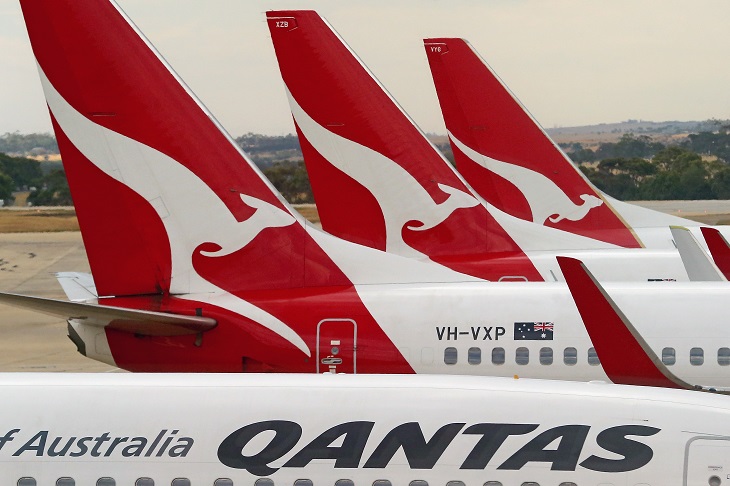There are few companies more conspicuously preoccupied with politics than Qantas.
Maybe it’s impossible to be a national carrier without becoming a national talking point, but under Alan Joyce, Qantas has made an art-form of conflating its commercial activity with the cause-célèbre of the day.
Like many of the world’s public companies, Qantas feels entitled to make such conflations. Evidently, it also feels well-endowed enough to manage the significant outlay of resources spent in pursuit of sociopolitical aims. Shareholder concerns over misallocation of capital have long ago been dealt with: for the 21st Century corporation, hog-tied by globalist groupthink and supra-national social justice obligations, a few million dollars spent paying homage to fashionable causes is just a part of doing business.
These sorts of companies have, for many years now, made the bet that the politics and economics of running a large corporation, whilst intertwined in the office, are essentially separable on the balance sheet. If more staff must be added to meet sustainability and social justice aims, this bloat needn’t contaminate the money-making wings of the company. In other words, so long as the punters are happy, they can do as they please in pursuit of whatever agenda takes their fancy.
Unfortunately for Qantas and their ilk, the punters are not happy. And neither are the regulatory bodies. As a result, it appears as though Qantas may now be held to account for selling tickets on flights already canceled.
The ACCC’s filing of a lawsuit in the Federal Court on Thursday bells the Qantas cat.
In moving against the airline, the ACCC exposes the conceit of the company in believing it can maintain its commercial and national-interest imperatives, whilst indulging in folly which little serves the needs of either shareholders or the Australian people.
Writing in The Australian, Robyn Ironside reports that ACCC chair Gina Cass-Gottlieb, ‘would not comment on whether the [ticket sales on canceled flights] were part of a deliberate strategy to increase revenue or the result of a systems failure’.
The question posed by Ironside points to two fundamental reasons as to why Qantas arrives in its current predicament.
The first and more immediate cause is a loss of institutional competence.
There are few things more fundamental to a travel or logistics business than scheduling. This should be a practiced art-form in an intercontinental airline, and its apparent absence at Qantas points to a severe lapse in competence.
The second and more troubling cause is the potential loss of institutional morality. If, as the allegation posed intimates, Qantas allegedly engaged in a ‘deliberate strategy’ that mislead customers, it would point to an even more severe indictment.
Customers of Qantas already know the answer to these questions, and most frequent flyers know the truth is that both corporate competency and morality are in severe decline. Of course, in the latter case, the airline would point to its growing train of social causes as evidence to the contrary. But we know all too well that these corporate crusades have little to do with real care for real people, and everything to do with mere expedient attachment to fashionable things.
Qantas itself must surely know it faces an institutional crisis as Australia’s flagship carrier. Joyce’s 15-year reign of increasing activism has not now, and has not ever, managed to silo politics from economics. At the tail end of his tenure, the chickens have come home to roost, and his successor will be forced to clean up the muck. The airline’s board may be in for belated recognition that there is economics in politics, after all.
In crafting his three laws of economics, Adam Smith set the stage for the rise of the corporation. Smith held that self-interest, competition, and supply and demand formed the governing principles of the modern marketplace.
Qantas willfully distorts Smith’s first law. Where self-interest should rule, it instead indulges in mere selfish interest. Its corporate actions have benefited the sensibilities of its leadership, not the needs of the company at large. It has shamefully lobbied the government to circumvent the second law, cynically blocking its competitors from healthy expansion.
However strong its affectations upon the hearts of the Australian people, Qantas has become a blight on the national marketplace. There is little to suggest Joyce’s departure alone will fix its problems, but we can only hope.
Ben Crocker is a fellow at Common Sense Society. His Substack is Crocker’s Columns.
Got something to add? Join the discussion and comment below.
Get 10 issues for just $10
Subscribe to The Spectator Australia today for the next 10 magazine issues, plus full online access, for just $10.


























Comments
Don't miss out
Join the conversation with other Spectator Australia readers. Subscribe to leave a comment.
SUBSCRIBEAlready a subscriber? Log in